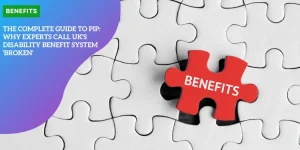Understanding PIP: A Deep Dive into the UK’s Disability Benefit System and Proposed Changes
Introduction to PIP: What Is It and Who Benefits?
Overview of Personal Independence Payment (PIP) and Its Purpose
The Personal Independence Payment (PIP) is an essential benefit aimed at supporting individuals with long-term disabilities or health issues in managing the additional expenses their conditions may bring.
Established to replace the Disability Living Allowance (DLA) for those aged 16 to 64, PIP aims to provide financial support essential for maintaining a decent standard of living and covering the various additional expenses that come with disabilities, irrespective of one’s employment status.
Current Statistics: Growing Need and Usage
As of recent data, there are 3.6 million individuals claiming PIP in the UK, a significant increase of 1.1 million since the pre-Covid era.
This drastic rise reflects the increasing recognition of the financial hardships faced by individuals with disabilities and the growing awareness of PIP’s vital role in providing necessary support.

How PIP Helps with Extra Costs Incurred by Disability
PIP is designed to alleviate the financial burdens faced by people with disabilities. These can include higher utility bills due to needing a warmer home, the costs of specialized equipment, and additional medical expenses not covered by the NHS.
By providing funds that can be used towards these costs, PIP ensures that recipients can live more comfortably and autonomously.
Additionally, the benefit is available regardless of whether the claimant is employed, recognizing that disabilities incur extra costs independent of employment status.
Understanding the structure and purpose of PIP sets the stage for discussing the implications of Labour’s proposed cuts amid efforts to balance fiscal responsibility.
Labour’s Proposed Cuts: Understanding the Financial Context
The £6 Billion Savings Target
As part of its new financial strategy, the Labour government has set a £6 billion savings target, with significant changes planned for the Personal Independence Payment (PIP).
This includes tightening eligibility criteria and freezing payment increases, measures that are causing considerable debate among policymakers.
Tightening Eligibility Criteria
One of the most controversial aspects of Labour’s proposed cuts is the tightening of eligibility criteria.
This means making it harder for individuals to qualify for PIP by altering the descriptors assessors use to evaluate claims.
These changes aim to reduce the number of people who can access the benefit, contributing to the government’s broader cost-cutting goals.
Freezing Payment Increases
Additionally, Labour plans to freeze PIP payment increases next year, meaning they will not adjust for inflation as they have in previous years.
This decision is part of the government’s strategy to keep expenditure under control amidst rising costs in other health-related benefits, which have surged by 25% since before the Covid pandemic.
Government Rationale
The government argues that these changes are necessary due to the increasing financial pressures caused by rising benefit claims.
With spending on health-related benefits expected to climb to £70 billion before the next election, Labour has labelled the current system ‘unsustainable, indefensible and unfair’.
The government believes that these measures will ensure that only those most in need receive support, aligning with the principle that if individuals can work, they should, and the government should facilitate that where possible.
Conclusion
Understanding the financial context behind Labour’s proposed cuts to PIP is crucial for grasping the broader implications for millions of claimants.
While the government frames these cuts as necessary fiscal management, they also prompt concerns about the potential negative impacts on the disabled community.
The Current Application Process: A Complex Journey
Initial Steps: Making the Call
Applying for Personal Independence Payment (PIP) begins with a phone call to the Department for Work and Pensions (DWP).
This initial interaction can itself be a hurdle due to wait times and the requirement to provide detailed personal information right off the bat.
Applicants then receive a lengthy paper form, which entails answering over 90 questions about their health conditions and how these affect their daily lives and mobility.
The Lengthy Form: A Mountain of Questions
Completing the form is no small feat; it’s a comprehensive examination into the minutiae of one’s disability.
Many find it exhausting and repetitive, often needing assistance from healthcare workers, family members, or disability advocates.
Questions delve into everyday activities such as preparing food, washing, dressing, and mobility, requiring detailed responses supported by medical evidence.
The Assessment: Facing The Gatekeepers
Once the form is submitted, most applicants undergo an assessment.
This can be conducted over the phone or in person. Private companies like Serco, Maximus, and Capita run these evaluations.
Assessed by “functional specialists” —who must have at least one year’s experience as healthcare professionals— these assessors are questioned over their true understanding of diverse and often complex health conditions.
Complexities and Concerns
The process of applying is often marked by multiple layers of difficulty and apprehension.
Many welfare experts argue that assessors are not adequately equipped to grasp the daily impacts of various disabilities.
This lack of understanding can result in erroneous decisions.
A notable concern is the treatment of claimants, who often feel they are met with suspicion rather than empathy, contributing to a process described as “stressful and degrading”.
Additionally, while many claims result in awards, a significant portion are overturned upon appeal—22% at the initial stage and a staggering 68% at the tribunal level.
Such statistics highlight systemic failures and the need for a more compassionate approach.
The following sections will delve into these systemic issues and explore the lived experiences of PIP claimants, shedding light on the emotional toll and the urgent need for genuine reform.
Systemic Flaws in the Assessment System
The Personal Independence Payment (PIP) system has been riddled with issues, leaving claimants struggling even after the application process. One evident flaw is the high rate of overturned decisions at various appeal stages.
Around 22% of PIP decisions are overturned at the initial appeal, and this figure escalates to a staggering 68% at the tribunal stage.
This data highlights significant discrepancies in the initial assessments, pointing to systemic issues within the system.
One striking contradiction within the PIP system is the officially reported 0% fraud rate, which stands in sharp contrast to the often sceptical manner in which claimants are treated.
The system seems to operate under the presumption of dishonesty, subjecting claimants to rigorous scrutiny.
This approach undermines confidence in the system and disregards the genuine needs of disabled individuals.
Consider the case of Lucy, who faced rejection because she stood in the waiting room, even though her standing was due to a lack of seats rather than her physical capability.
Another claimant was denied mobility support for mentioning they let their dog out, despite the context that they were unable to walk the dog properly.
These examples underscore how minor and misunderstood details can lead to unfair rejections.
The systemic flaws in PIP assessments not only cast doubt on the fairness and accuracy of decisions but also precipitate a cycle of stress and uncertainty for claimants.
A significant overhaul is necessary to address these issues, ensuring that the system becomes more empathetic and reliable for those it is meant to support.
Real-Life Experiences: Voices of PIP Claimants
Lucy’s Struggles
Lucy, a 53-year-old mother from Kent, has had a long and arduous journey with PIP.
Her health issues include digestive system problems, nerve pain, and mobility restrictions due to a hip replacement.
She moved to Kent from London to continue her independent business but had to give it up when she became unable to drive.
When Lucy’s health began to decline, she submitted a PIP application in 2015 but was denied without undergoing an assessment.
Even when she re-applied and secured an assessment, she was denied because she was able to stand in a crowded waiting room with a walking stick.
It took seven years and multiple appeals, with Lucy only receiving PIP in 2022 after a tribunal.
Francess Kray’s Battles
Francess Kray, 45, suffers from PTSD and facial neuralgia, among other health issues.
She applied for PIP in 2018 and won her case in 2020 after appealing to a tribunal.
However, three months later, her entitlement was reduced, forcing her into yet another round of appeals, this time successfully.
Her story underscores the anxiety and emotional toll repetitive assessments can cause.
Francess states, “As soon as that letter of your next assessment reaches your front door, the anxiety is there”.
The Human Cost of Delays
The PIP system is known for its extensive delays. Startlingly, 1,300 applicants died between 2023 and 2024 while waiting for their benefits decision.
These delays are not just a statistic; they represent real lives disrupted, causing significant emotional and financial distress.
The Emotional Toll
Both Lucy and Francess’s stories highlight not only the logistical hurdles involved in securing PIP but also the emotional strain.
The fear of losing financial stability, the repeated rejections, and the intrusive assessments contribute to a sense of powerlessness and prolonged mental stress.
Every letter about another assessment feels like a daunting challenge to their already compromised well-being.
The voices of PIP claimants like Lucy and Francess highlight systemic flaws in the current system, emphasising the urgent need for reforms that consider their real-life experiences.
Addressing these issues requires more than just policy changes; it demands a fundamental shift in how disabled individuals are viewed and treated within society.
This shift is essential for creating a system that is both fair and compassionate.
Expert Opinions and Advocacy Responses
Warnings from Organisations
The proposed cuts to Personal Independence Payment (PIP) have drawn sharp criticism from various advocacy groups, such as Disability Rights UK, Citizens Advice, and Scope.
These organisations stress the potential consequences of reducing this vital benefit, warning that thousands of disabled individuals could be pushed deeper into poverty.
They argue that while reform is necessary, cuts to PIP are counterproductive and will exacerbate the challenges faced by Britain’s disabled population.
Potential Poverty Increase
Welfare experts estimate that around 700,000 disabled people could fall below the poverty line if PIP support is insufficient.
David Southgate, policy manager at Scope, said “life costs a lot more when you’re disabled, and disability benefits are a lifeline”.
He underscores the essential nature of these benefits in covering the additional, often substantial, expenses related to living with a disability.
Without adequate financial assistance, many individuals could struggle to meet basic needs and maintain a reasonable quality of life.
Calls for Collaboration
The advocacy groups are not merely expressing concern but calling for collaborative efforts to reform the system.
They urge the government to work closely with disabled individuals to address the systemic flaws rather than imposing arbitrary cuts.
This dialogue would be instrumental in creating a system that respects and adequately supports the unique circumstances of each claimant.
Collaborating with those affected ensures that their voices and experiences shape more effective and humane policies.
Conclusion
The warnings from advocacy groups highlight the critical nature of maintaining and improving support for PIP claimants.
It is clear that cutting financial aid would have severe repercussions, pushing many vulnerable people into poverty.
Going forward, there is an imperative to involve disabled individuals in the reform process to ensure that changes benefit those in need, rather than merely fulfilling financial targets.
Alternative Approaches to Reform
Improving the Assessment Process
When considering alternatives to the current assessment process for Personal Independence Payment (PIP), a key focus is to simplify and humanise the procedure.
The process must be revamped to better reflect the unique challenges faced by individuals with disabilities.
This could involve streamlining the application steps, providing in-depth training for assessors on diverse health conditions, and employing a more empathetic approach.
Importantly, assessments should be conducted by professionals with specialised knowledge, which, from past critiques, seems to be lacking in the present framework.
Addressing Systemic Issues Beyond Cost-Cutting
Rather than solely focusing on budget cuts, addressing the intrinsic flaws within the PIP system should be a priority.
The high rate of appeals being overturned, which underscores systemic errors, indicates that reform needs to be deeper than the superficial criteria tightening or freezing payments.
Strengthening the decision-making process to correctly reflect individuals’ needs the first time could mitigate the undue stress of lengthy appeal processes.
Inclusive Reform Design
A crucial step forward is actively involving disabled individuals in the conversation on reform.
This ensures that the system is not only theoretically sound but practically applicable and respectful of those it intends to serve.
Disabled individuals are best placed to voice their concerns and provide input on how the system affects them, thus making their involvement indispensable.
Collaborative efforts with organisations such as Disability Rights UK and Citizens Advice can work towards creating a more dignified and supportive structure.
The dialogue around reform is not just about figures and savings; it’s about building a future where support systems effectively uphold the dignity and needs of every individual.
Conclusion: Balancing Fiscal Responsibility and Social Support
The Tension Between Budget Constraints and Support
The debate around Labour’s proposed cuts to Personal Independence Payment (PIP) reveals a core tension: balancing fiscal responsibility with the obligation to support vulnerable citizens.
With a savings target of £6 billion, Labour views the current system as ‘unsustainable, indefensible and unfair’.
However, critics argue that making it harder for people to qualify for PIP and freezing payment increases could undermine essential support for millions of disabled individuals.
Broader Implications for UK Welfare Policy
Cuts to PIP could have far-reaching implications beyond immediate financial savings.
Reducing accessibility to PIP means many disabled people might be unable to afford necessary aids and adaptations, pushing a large segment of the population closer to poverty.
Welfare systems fundamentally reflect societal values; dismantling such support mechanisms risks compromising the UK’s commitment to inclusivity and equality.
Alarmingly, approximately 700,000 disabled people could be pushed into poverty without adequate support.
Potential Compromises and Solutions
Addressing this issue requires innovative solutions that reconcile economic constraints with social responsibility.
Improving the PIP assessment process is key.
Reducing the complexity of applications and ensuring assessments are conducted by adequately trained professionals would minimise erroneous denials.
Collaborative efforts that involve disabled individuals in the design and reform of the system are also essential.
Such approaches can lead to a more empathetic, efficient service that respects the dignity of claimants.






